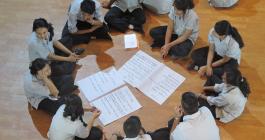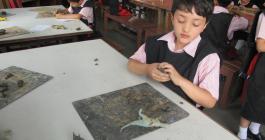Rato Bangala Kitab
Mission:
Rato Bangala Kitab believes in developing a culture of reading by creating attractive, relevant and enjoyable books for children.
Rato Bangala Kitab believes that neither the curriculum presently available for Nepali Children, nor the implementation of that curriculum allows for the whole person development of a child, whether he/she lives amidst Kathmandu's affluence or in remote parts of rural Nepal. Keeping the situation in perspective, one must note that Nepal's experience with modem education goes back just over half a century, which partially explains the low overall standard of education. It is very important therefore, to immediately put in place programs to develop an education system that caters to the emotional, social, and physical needs of a child as well as his/her academic needs.
Rato Bangala Kitab has specialized in publishing stimulating and culture-specific literature for Nepali children. Given the generally low production values of children's literature in Nepal, Rato Bangala Kitab has worked to maintain high standards in term of paper, use of color and layout.
Literature for children provides the young with personal fulfillment as well as academic growth. Here are some very important reason about why Rato Bagala Kitab is engaged in publishing quality children's literature. Many of our books have received awards, the most common of which is the Bal Sahitya Samajh award.
Enjoyment
The most important gift of books is enjoyment. Through reading, children have many vicarious experiences; they travel to the distant places and the times; their imagination and creativity are enhanced. The young one's horizons are broadened, they become aware of their surroundings, and their understanding of the world is heightened. Good artwork and illustrations in quality books foster's the child's appreciation of the art.
Empathy
It is not possible for parents or teachers to teach all the good qualities that children are required to live a qualitative and productive life. Reading good books provides children the opportunity, making full sense of their imagination, to step into someone else's shoe. The qualities of empathy and compassion are best inculcated through reading, for it allows young minds to learn in-depth information about other cultures and life-styles.
Values
Books are the best medium to impart values to children. The dilemmas that characters face in a story, for example, and the decisions that they make provide concrete examples of value choices to be made. While reading, consciously and subconsciously, children examine their own values and themselves make choices. In this area, too, good books teach invaluable lessons that cannot always be taught by parents, guardians or teachers.
Role Models
Certain characters in books provide role models for young readers. Reading age-appropriate books with same-aged characters helps in this important identification. Biographies of people also present positive role-models for children. In addition to reading books, children should discuss the books they read. Discussions provide opportunity for children to clarify their doubts, air their frustrations and to have positive reactions reinforced. Children also learn to listen to different points of view, and to share their own ideas without embarrassment or intimidation.
Reinforces Academic Skills
Good reading habits help children to well in school. Children who read fluently understand concepts more clearly and grasp the subject matter more easily, Exposed to a variety of writing styles, children who read also tend to be better writers than those who do not read. Academic performance is also enhanced for children who read. In the Nepali context, where classroom facilities and teaching standards tend to be low, the availability of good books will provide children with the means to let their minds and imaginations soar.
While older children can read independently as look as quality books are made available to them, it is imperative that parents and guardians read to the younger ones. Reading to young children from infancy is a tradition that is as yet alien to Nepali adults, but it is a habit that has to be established. Psychologists have confirmed the benefits of reading to children in terms of wholesome development of the child's intellect and personality. In conclusion, it is important for Nepal's children to read books, and for younger children to be read to. First they need good books.
To learn more, visit here>> www.ratobangalakitab.com



